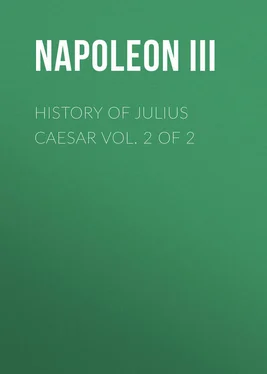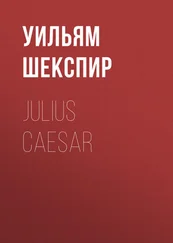Napoleon III - History of Julius Caesar Vol. 2 of 2
Здесь есть возможность читать онлайн «Napoleon III - History of Julius Caesar Vol. 2 of 2» — ознакомительный отрывок электронной книги совершенно бесплатно, а после прочтения отрывка купить полную версию. В некоторых случаях можно слушать аудио, скачать через торрент в формате fb2 и присутствует краткое содержание. Жанр: foreign_antique, foreign_prose, Биографии и Мемуары, на английском языке. Описание произведения, (предисловие) а так же отзывы посетителей доступны на портале библиотеки ЛибКат.
- Название:History of Julius Caesar Vol. 2 of 2
- Автор:
- Жанр:
- Год:неизвестен
- ISBN:нет данных
- Рейтинг книги:4 / 5. Голосов: 1
-
Избранное:Добавить в избранное
- Отзывы:
-
Ваша оценка:
- 80
- 1
- 2
- 3
- 4
- 5
History of Julius Caesar Vol. 2 of 2: краткое содержание, описание и аннотация
Предлагаем к чтению аннотацию, описание, краткое содержание или предисловие (зависит от того, что написал сам автор книги «History of Julius Caesar Vol. 2 of 2»). Если вы не нашли необходимую информацию о книге — напишите в комментариях, мы постараемся отыскать её.
History of Julius Caesar Vol. 2 of 2 — читать онлайн ознакомительный отрывок
Ниже представлен текст книги, разбитый по страницам. Система сохранения места последней прочитанной страницы, позволяет с удобством читать онлайн бесплатно книгу «History of Julius Caesar Vol. 2 of 2», без необходимости каждый раз заново искать на чём Вы остановились. Поставьте закладку, и сможете в любой момент перейти на страницу, на которой закончили чтение.
Интервал:
Закладка:
They were naturally agriculturists, and we may suppose that the institution of private property existed among them, because, on the one hand, all the citizens paid the tax, except the Druids, 88and, on the other, the latter were judges of questions of boundaries. 89They were not unacquainted with certain manufactures. In some countries they fabricated serges, which were in great repute, and cloths or felts; 90in others they worked the mines with skill, and employed themselves in the fabrication of metals. The Bituriges worked in iron, and were acquainted with the art of tinning. 91The artificers of Alesia plated copper with leaf-silver, to ornament horses’ bits and trappings. 92
The Gauls fed especially on the flesh of swine, and their ordinary drinks were milk, ale, and mead. 93They were reproached with being inclined to drunkenness. 94
They were frank and open in temper, and hospitable toward strangers, 95but vain and quarrelsome; 96fickle in their sentiments, and fond of novelties, they took sudden resolutions, regretting one day what they had rejected with disdain the day before; 97inclined to war and eager for adventures, they showed themselves hot in the attack, but quickly discouraged in defeat. 98Their language was very concise and figurative; 99in writing, they employed Greek letters.
The men were not exempt from a shameful vice, which we might have believed less common in this county than among the peoples of the East. 100The women united an extraordinary beauty with remarkable courage and great physical force. 101
The Gauls, according to the tradition preserved by the Druids, boasted of being descended from the god of the earth, or from Pluto ( Dis ), according to the expression of Cæsar. 102It was for this reason that they took night for their starting-point in all their divisions of time. Among their other customs, they had one which was singular: they considered it as a thing unbecoming to appear in public with their children, until the latter had reached the age for carrying arms. 103
When he married, the man took from his fortune a part equal to the dowry of the wife. This sum, placed as a common fund, was allowed to accumulate with interest, and the whole reverted to the survivor. The husband had the right of life and death over his wife and children. 104When the decease of a man of wealth excited any suspicion, his wives, as well as his slaves, were put to the torture, and burnt if they were found guilty.
The extravagance of their funerals presented a contrast to the simplicity of their life. All that the defunct had cherished during his life, was thrown into the flames after his death; and even, before the Roman conquest, they joined with it his favourite slaves and clients. 105
In the time of Cæsar, the greater part of the peoples of Gaul were armed with long iron swords, two-edged (σπἁθη), sheathed in scabbards similarly of iron, suspended to the side by chains. These swords were generally made to strike with the edge rather than to stab. 106The Gauls had also spears, the iron of which, very long and very broad, presented sometimes an undulated form ( materis , σαὑνιον). 107They also made use of light javelins without amentum , 108of the bow, and of the sling. Their helmets were of metal, more or less precious, ornamented with the horns of animals, and with a crest representing some figures of birds or savage beasts, the whole surmounted by a high and bushy tuft of feathers. 109They carried a great buckler, a breastplate of iron or bronze, or a coat of mail – the latter a Gaulish invention. 110The Leuci and the Remi were celebrated for throwing the javelin. 111The Lingones had party-coloured breastplates. 112The Gaulish cavalry was superior to the infantry; 113it was composed of the nobles, followed by their clients; 114yet the Aquitanians, celebrated for their agility, enjoyed a certain reputation as good infantry. 115In general, the Gauls were very ready at imitating the tactics of their enemies. 116The habit of working mines gave them a remarkable dexterity in all underground operations, applicable to the attack and defence of fortified posts. 117Their armies dragged after them a multitude of wagons and baggage, even in the less important expeditions. 118
Although they had reached, especially in the south of Gaul, a tolerably advanced degree of civilisation, they preserved very barbarous customs: they killed their prisoners. “When their army is ranged in battle,” says Diodorus, “some of them are often seen advancing from the ranks to challenge the bravest of their enemies to single combat. If their challenge is accepted, they chaunt a war-song, in which they boast of the great deeds of their forefathers, exalting their own valour and insulting their adversary. After the victory, they cut off their enemy’s head, hang it to their horse’s neck, and carry it off with songs of triumph. They keep these hideous trophies in their house, and the highest nobles preserve them with great care, bathed with oil of cedar, in coffers, which they show with pride to their guests.” 119
When a great danger threatened the country, the chiefs convoked an armed council, to which the men were bound to repair, at the place and day indicated, to deliberate. The law required that the man who arrived last should be massacred without pity before the eyes of the assembly. As a means of intercommunication, men were placed at certain intervals through the country, and these, repeating the cry from one to another, transmitted rapidly news of importance to great distances. They often, also, stopped travellers on the roads, and compelled them to answer their questions. 120
The Gauls were very superstitious. 121Persuaded that in the eyes of the gods the life of a man can only be redeemed by that of his fellow, they made a vow, in diseases and dangers, to immolate human beings by the ministry of the Druids. These sacrifices had even a public character. 122They sometimes constructed human figures of osier of colossal magnitude, which they filled with living men; to these they set fire, and the victims perished in the flames. These victims were generally taken from among the criminals, as being more agreeable to the gods; but if there were no criminals to be had, the innocent themselves were sacrificed.
Cæsar, who, according to the custom of his countrymen, gave to the divinities of foreign peoples the names of those of Rome, tells us that the Gauls honoured Mercury above all others. They raised statues to him, regarded him as the inventor of the arts, the guide of travellers, and the protector of commerce. 123They also offered worship to divinities which the “Commentaries” assimilate to Apollo, Mars, Jupiter, and Minerva, without informing us of their Celtic names. From Lucan, 124we learn the names of three Gaulish divinities, Teutates (in whom, no doubt, we must recognise the Mercury of the “Commentaries”), Hesus or Esus, and Taranis. Cæsar makes the remark that the Gauls had pretty much the same ideas with regard to their gods as other nations. Apollo cured the sick, Minerva taught the elements of the arts, Jupiter was the master of heaven, Mars the arbiter of war. Often, before fighting, they made a vow to consecrate to this god the spoils of the enemy, and, after the victory, they put to death all their prisoners. The rest of the booty was piled up in the consecrated places, and nobody would be so impious as to take anything away from it. The Gauls rendered also, as we learn from inscriptions and passages in different authors, worship to rivers, fountains, trees, and forests: they adored the Rhine as a god, and made a goddess of the Ardenne. 125
Institutions
IV. There were in Gaul, says Cæsar, only two classes who enjoyed public consideration and honours, 126the Druids and the knights. As to the people, deprived of all rights, oppressed with debts, crushed with taxes, exposed to the violences of the great, their condition was little better than that of slaves. The Druids, ministers of religion, presided over the sacrifices, and preserved the deposit of religious doctrines. The youth, greedy of instruction, pressed around them. The dispensers of rewards and punishments, they were the judges of almost all disputes, public or private. To private individuals, or even to magistrates, who rebelled against their decisions, they interdicted the sacrifices, a sort of excommunication which sequestrated from society those who were struck by it, placed them in the rank of criminals, removed them from all honours, and deprived them even of the protection of the law. The Druids had a single head, and the power of this head was absolute. At his death, the next in dignity succeeded him; if there were several with equal titles, these priests had recourse to election, and sometimes even to a decision by force of arms. They assembled every year in the country of the Carnutes, in a consecrated place, there to judge disputes. Their doctrine, it was said, came from the isle of Britain, where, in the time of Cæsar, they still went to draw it as at its source. 127
Читать дальшеИнтервал:
Закладка:
Похожие книги на «History of Julius Caesar Vol. 2 of 2»
Представляем Вашему вниманию похожие книги на «History of Julius Caesar Vol. 2 of 2» списком для выбора. Мы отобрали схожую по названию и смыслу литературу в надежде предоставить читателям больше вариантов отыскать новые, интересные, ещё непрочитанные произведения.
Обсуждение, отзывы о книге «History of Julius Caesar Vol. 2 of 2» и просто собственные мнения читателей. Оставьте ваши комментарии, напишите, что Вы думаете о произведении, его смысле или главных героях. Укажите что конкретно понравилось, а что нет, и почему Вы так считаете.












